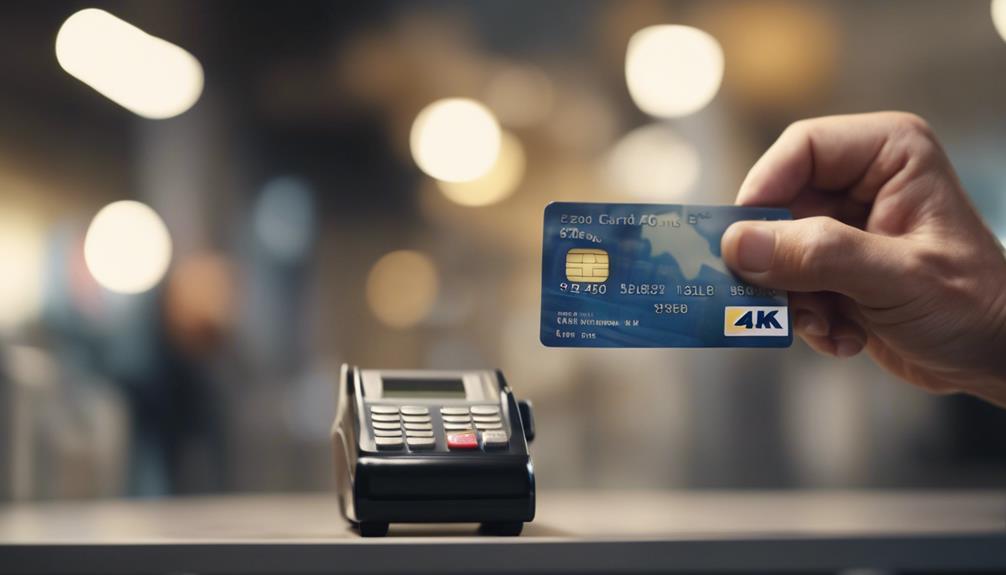Considering financing options for your business? Merchant Cash Advances offer fast funds with flexible repayment based on daily credit card sales. They're beneficial for quick access, especially during revenue fluctuations, and approval is possible even with bad credit. However, be cautious of high interest rates, lack of regulation, and daily deductions affecting cash flow and control. Careful consideration is advised due to potential debt cycles and limited long-term financial solutions. Learn about the impact on cash flow, comparison with traditional financing, and important factors for decision-making to make informed choices. Additionally, it’s important to carefully manage cash flow when utilizing a merchant cash advance. Implementing strategies such as monitoring daily credit card sales, reducing unnecessary expenses, and negotiating better terms with suppliers can help maintain healthy cash flow. Seeking professional advice and considering alternative financing options, such as a business line of credit or small business loan, can provide more sustainable solutions for long-term financial stability. For managing cash flow tips, consult with financial experts and utilize cash flow management software to accurately track and forecast future cash flow.
Key Takeaways
- Fast access to funds in 24-48 hours.
- Flexible repayment based on credit card sales.
- Approval possible with bad credit.
- No collateral requirement.
- Fixed repayment amount prevents late fees.
Overview of Merchant Cash Advances

Merchant Cash Advances, a financing option popular among businesses with high credit card sales, provide a lump sum in exchange for a percentage of future credit card transactions. Small businesses often turn to MCAs for quick funding, as the approval process is swift, typically within 24-48 hours, requiring minimal paperwork and no collateral. The repayment structure is based on a fixed percentage of daily credit card sales, offering flexibility in managing cash flow.
However, it's important to note that MCAs come with higher interest rates compared to traditional loans. This aspect is a trade-off for the convenience and accessibility they offer. While MCAs can be beneficial for businesses in need of immediate cash and unable to qualify for a traditional loan, the higher cost should be carefully considered. Understanding the fixed percentage that will be deducted from your daily credit card transactions is vital to ensure it aligns with your business's financial health and goals.
Advantages of MCAs

When considering Merchant Cash Advances (MCAs), you benefit from fast access to funds within 24-48 hours, allowing you to address immediate financial needs swiftly.
Additionally, MCAs offer flexible repayment options based on your credit card receipts, providing you with the freedom to adjust payments according to your business's cash flow.
This flexibility can be especially advantageous during periods of fluctuating revenue, giving you peace of mind as you manage your financial obligations.
Fast Access to Funds
With Merchant Cash Advances, obtaining quick access to funds is a key advantage for businesses in need of immediate financial support. Approval for MCAs is often granted within 24-48 hours, allowing for quick funding to address pressing financial needs.
Businesses can secure funds without the requirement of fixed monthly installments, as repayment is based on a percentage of credit card receipts. Even if you have bad credit, you may still qualify for an MCA, as lenders prioritize future business prospects over credit scores.
Additionally, MCAs don't necessitate collateral, providing financing without risking property or equipment. The fixed repayment amount characteristic of MCAs helps to prevent late fees or accruing interest, offering a straightforward financing solution.
Flexible Repayment Options
Enjoy the flexibility of repayment options offered by merchant cash advances, tailored to your business's daily credit card sales. With adaptable payment structures, repayment amounts adjust based on your revenue, assisting in managing cash flow effectively.
Merchant cash advances don't have fixed repayment amounts or terms, providing the freedom to benefit from larger or smaller repayment amounts depending on your daily sales performance. The dynamic repayment model of MCAs allows for a customized approach to match your business's financial situation.
This feature can be advantageous in offering a tailored repayment plan that aligns with your cash flow needs while ensuring flexibility in meeting your obligations.
Disadvantages of MCAs

Considering the high costs and lack of regulation associated with Merchant Cash Advances (MCAs), businesses should carefully evaluate the disadvantages before opting for this financing option. MCAs can be expensive, with APRs soaring up to 350%, making them an expensive financing choice. The lack of regulatory oversight in the MCA industry can result in high interest fees, potentially burdening businesses further.
Additionally, the daily deductions from credit card sales to repay the advance can disrupt cash flow, impacting daily operations. Businesses may also face limited control over their operations and decision-making processes when tied to MCAs.
While MCAs offer a short-term solution, they may not address underlying issues and could lead to a debt cycle if not managed prudently. It's important to weigh these factors carefully before committing to this form of financing to ensure it aligns with your business's long-term financial health.
Factors to Consider Before Choosing MCAs

Before opting for Merchant Cash Advances (MCAs), carefully assess several key factors to make an informed decision about this financing option. Initially, consider the high cost associated with MCAs, as they often come with high-interest fees, with Annual Percentage Rates (APRs) potentially soaring up to 350%.
Additionally, evaluate the short-term nature of MCAs; they mightn't be suitable for addressing long-term financial needs, potentially leading to further financial challenges down the line.
Be mindful of the daily fund deductions that MCAs require, as these can impact your business's cash flow on a daily basis. It's important to note the lack of industry regulations governing MCAs, which could expose you to unfavorable terms and high fees.
Also, be aware of potential restrictions on your business operations and the loss of control that may accompany opting for MCAs. Thoughtful consideration of these factors is vital in determining if MCAs align with your business's financial requirements.
Impact of MCAs on Business Cash Flow

Managing cash flow when utilizing Merchant Cash Advances (MCAs) involves closely monitoring the daily deductions from your credit card sales to guarantee operational funds remain sufficient. The fixed percentage taken from your credit card sales for MCA repayment can pose cash flow challenges, impacting the availability of funds for essential operational expenses.
Fluctuations in sales volumes directly influence the amount deducted daily, further affecting your cash flow. To navigate these challenges, it's important to carefully manage cash flow and plan accordingly to make sure that daily repayments don't hinder your business operations.
Comparison With Traditional Business Financing

Exploring the landscape of financing options for your business, it's valuable to contrast merchant cash advances with traditional business loans. When considering small business financing, merchant cash advances stand out for their speedy approval process, typically taking 24-48 hours compared to the longer approval times of traditional business loans.
Unlike traditional loans that often require fixed monthly installments, merchant cash advances offer a more flexible repayment structure based on a percentage of your credit card sales.
Moreover, businesses with bad credit can find it easier to qualify for merchant cash advances, whereas traditional loans may demand a good credit score for approval. Another significant difference is that merchant cash advances generally don't necessitate collateral, unlike traditional loans that may require assets as security.
Additionally, merchant cash advances provide a fixed repayment amount, eliminating the risk of accruing interest or facing late fees commonly associated with traditional loans. This comparison highlights the contrasting features between these two financing options, allowing you to make an informed decision based on your business's specific needs.
Frequently Asked Questions
Can a Merchant Cash Advance Hurt Your Credit?
A merchant cash advance can potentially impact your credit if you default on the payment, leading to collections and a negative effect on your credit score.
However, simply taking out a merchant cash advance typically doesn't directly affect your credit score since it's not reported to credit bureaus.
It's important to be mindful of the terms and consequences to make sure you manage your business's credit profile effectively and avoid any adverse impacts on your credit score.
What Are the Benefits of a Merchant Cash Advance?
When considering a merchant cash advance, you benefit from:
- Quick access to capital within 24-48 hours
- Repayments based on credit card sales
- Approval based on business prospects
- No need for collateral
Imagine it as a lifeline for your business, providing fixed repayment amounts without accruing interest. This option can be advantageous for businesses needing immediate funds and flexible payment structures to support growth and operations.
What Are the Cons of a Cash Advance?
When considering a cash advance for your business, it's important to weigh the drawbacks. High costs, with APRs reaching 350%, can burden your finances. These advances are short-term solutions, unfit for long-term needs, potentially leading to a debt cycle.
Daily deductions tied to credit card sales impact cash flow. Lack of regulation exposes you to high fees and predatory practices. Loss of control over operations and decision-making is a risk due to advance terms.
Are Merchant Cash Advances Predatory?
Merchant cash advances can be viewed as predatory due to their high APRs, costly fees, and potential to trap businesses in debt cycles. Critics argue that the lack of regulation in this industry raises concerns about transparency and fairness.
While these advances provide quick funding, businesses may struggle with daily or weekly deductions from their credit card sales for repayment, making them unsuitable for long-term financial solutions in certain circumstances.
Conclusion
To sum up, opting to finance your business with merchant cash advances can be akin to steering through a turbulent sea.
While the quick access to funds and flexibility can help you stay afloat in times of need, the high costs and potential impact on cash flow may create stormy waters ahead.
It's important to weigh the pros and cons carefully, considering your business goals and financial stability as you chart your course towards success.










